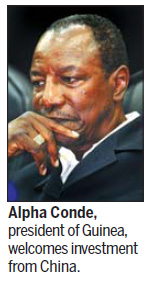Foreign and Military Affairs
Guinea seeks 'win-win' investment
Updated: 2011-05-04 07:31
By Ding Qingfen (China Daily)
KONAKRY, Guinea - Guinea "welcomes" Chinese investment to stimulate economic growth in what Alpha Conde, president of the West African state, said was a "win-win" situation.
"Guinea has abundant mining resources and China is a rapidly developing nation in great need of commodities and resources. We will open the door widely to Chinese companies and provide what China needs," Conde said. "It's a sort of win-win cooperation."
 |
Guinea has two thirds of the world's bauxite reserves and hopes that mining will provide a boost for its economy.
Inflation exceeding 20 percent has plagued one of the poorest countries in the world, but a Guinean government development plan for 2011-2015 seeks to invigorate the economy by focusing on "mining, agriculture, hydroelectricity and water supplies".
The country has 40 billion tons of bauxite reserves and 15 billion tons of high quality iron ore. Western companies, such as Alcoa and Rusal, currently dominate the mining sector.
Alcoa and Rusal have three projects in Guinea, producing bauxite worth $1.64 million in 2010. Rio Tinto recently signed a $700 million iron ore deal with the Guinean government.
The United States, Canada and some European nations provide the major source of foreign investment in Guinea, concentrated mostly on bauxite, gold and diamond mining.
|
||||
Chinese investment in Guinea, compared to that in other African nations, is relatively small and mainly focused on agriculture, fishing, telecom and contracted projects. Investment dropped 18.2 percent to $1.76 million in 2010.
In recent years a growing number of Chinese companies - including State-owned giants such as Chinalco and CPI International Minerals & Investment Co Ltd - began eyeing the mining sector. Some have already invested while others are in negotiations.
Fu Ziying, vice-minister of commerce, met Conde recently and was optimistic about future cooperation in the mining sector.
"We expect the investment environment to become stable, and there are also preferential policies tailored for Chinese companies under the new mining law."
The new administration, which took office last year, is revising legislation governing mining and the new draft is expected soon.
"We will standardize foreign investment activities here to really benefit our people," said Conde.
There is no doubting Guinea's mining potential but before it can be tapped the new law will have to be studied, said Shi Mingwei, general manager of CPI International Minerals & Investment.
The company is currently in talks with the Guinean government.
China's investment in Africa accumulated to $9.33 billion by 2009, according to a report by the Information Office of the State Council with much of it going to South Africa, Nigeria, Zambia and Sudan.
But that figure is dwarfed by investment from Western companies. Annual foreign direct investment into Africa is estimated to be $80-90 billion, with China accounting for about $1 billion.
But from a long-term perspective, China's investment in Africa will be "strong and sustainable", said Zheng Chao, commercial counselor of the Department of Outward Investment and Economic Cooperation under the Ministry of Commerce.
For decades, China has been active in providing aid to Guinea, including the construction of the landmark Guinea National Stadium.
"Guinea also needs to return (the favor) with what China needs," said Conde.
Bilateral trade in 2010 grew by 65.7 percent year-on-year to $476 million, with Chinese exports rising by 49.8 percent and imports surging by 781 percent.
E-paper

Head on
Chinese household care goods producers eye big cities, once stronghold of multinational players
Carving out a spot
Back onto center stage
The Chinese recipe
Specials

Bin Laden dead
The world's most wanted man was killed in a US raid in Pakistan.

British Royal Wedding
Full coverage of the royal wedding of Prince William and Kate Middleton in London. Best wishes

The final frontier
Xinjiang is a mysterious land of extremes that never falls to fascinate.



